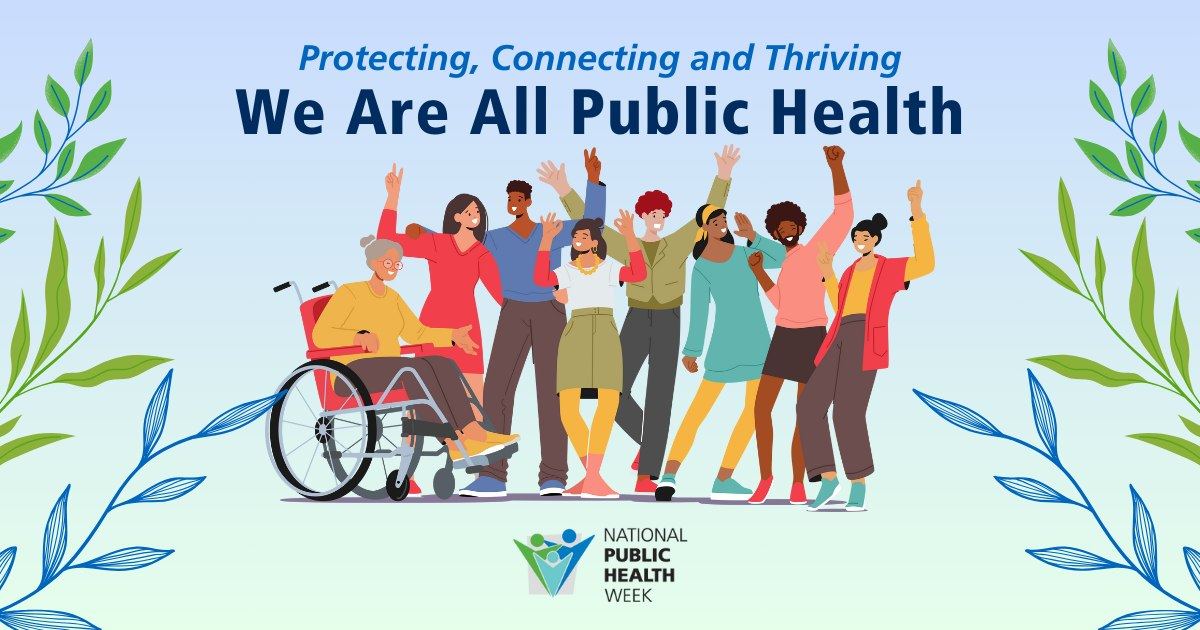Celebrate National Public Health Week April 1-7
By Rebekah Hall
U of A System Division of Agriculture
April 2, 2024
Fast Facts:
- National Public Health Week celebrates importance of public health, public health professionals, contributions
- Themes of the week include civic engagement, healthy neighborhoods, climate change and more
- Past public health innovations include Safe to Sleep, It Can Wait campaigns
(579 words)
(Newsrooms: With graphic)
LITTLE ROCK — In a world that has been changed by the COVID-19 pandemic, it is especially important to recognize the impact of public health and the work of public health professionals. During National Public Health Week from April 1-7, celebrate by learning more about the field’s innovative achievements.
Bryan Mader, extension assistant professor and health specialist for the University of Arkansas System Division of Agriculture, said “all health is public health, whether physical, mental, emotional, financial or otherwise.
“The health of each one of us affects the health of all of us,” Mader said. “Public health is the art and science of protecting and promoting the health of all people of a community, no matter how ‘community’ might be defined. Importantly, health equity — achieving the highest possible standard of health for all people — is a defining pillar of public health.
“Public health also seeks to remove barriers to health for all, such as poverty, racism, social injustice and other drivers of inequity for the social determinants of health,” he said.
On March 29, President Biden proclaimed April 1-April 7, 2024, as National Public Health Week, highlighting the progress in recovering from the COVID-19 pandemic, including the vaccination of 230 million Americans. Mader said the pandemic brought public health to the forefront of cultural consciousness.
“The nothing-short-of-miraculous public health work that was achieved during the COVID-19 pandemic has thrust ‘public health’ into the spotlight, garnering feedback, praise and criticism from an entirely new audience,” Mader said. “Maintaining the public’s trust in our science is one of the most important things we can hope to achieve through public health.
“Believing in a robust public health workforce and supporting those who work in public health —from boots on the ground to elected officials — sends a clear message that protecting the health of all is a value worthy of recognition,” he said.
Mader said National Public Health Week recognizes and celebrates the achievements of public health over time, especially “the people who ‘do’ public health.” These include community health workers, biostatisticians, nutritionists, social workers, first responders, restaurant inspectors, scientists and researchers.
“This week gives us an opportunity to reflect upon the many vast achievements of public health, many of which we take for granted, including clean water, vaccinations and food safety,” Mader said. “But it also prompts us to look ahead at what public health might achieve in the future: reimagining our healthcare system to place prevention at its core; proactive planning for the next global pandemic; realizing innovations to combat climate change; and proactive planning for an aging population. The possibilities are truly endless.”
Each day of National Public Health Week focuses on a specific public health topic, including the following:
- Monday: Civic Engagement
- Tuesday: Healthy Neighborhoods
- Wednesday: Climate Change
- Thursday: New Tools and Innovations
- Friday: Reproductive and Sexual Health
- Saturday: Emergency Preparedness
- Sunday: Future of Public Health
Mader said that during the week, the Public Health Communications Collaborative is highlighting some of the most important public health innovations of the last 30 years. This includes the Safe to Sleep campaign, which began in 1994 and encourages parents to place babies to sleep on their backs to reduce the risk of sudden infant death syndrome, or SIDS. This also includes the It Can Wait campaign, which AT&T launched in 2010 to help stop distracted driving.
For more information about National Public Health Week and to follow along with Division of Agriculture public health work, visit the Division of Agriculture’s Pathways to Health Facebook page.
To learn about extension programs in Arkansas, contact your local Cooperative Extension Service agent or visit www.uaex.uada.edu. Follow us on X and Instagram at @AR_Extension. To learn more about Division of Agriculture research, visit the Arkansas Agricultural Experiment Station website: https://aaes.uada.edu. Follow on X at @ArkAgResearch. To learn more about the Division of Agriculture, visit https://uada.edu/. Follow us on X at @AgInArk.
About the Division of Agriculture
The University of Arkansas System Division of Agriculture’s mission is to strengthen agriculture, communities, and families by connecting trusted research to the adoption of best practices. Through the Agricultural Experiment Station and the Cooperative Extension Service, the Division of Agriculture conducts research and extension work within the nation’s historic land grant education system.
The Division of Agriculture is one of 20 entities within the University of Arkansas System. It has offices in all 75 counties in Arkansas and faculty on five system campuses.
The University of Arkansas System Division of Agriculture offers all its Extension and Research programs to all eligible persons without regard to race, color, sex, gender identity, sexual orientation, national origin, religion, age, disability, marital or veteran status, genetic information, or any other legally protected status, and is an Affirmative Action/Equal Opportunity Employer.
# # #
Media Contact:
Rebekah Hall
rkhall@uada.edu
@RKHall_
501-671-2061
